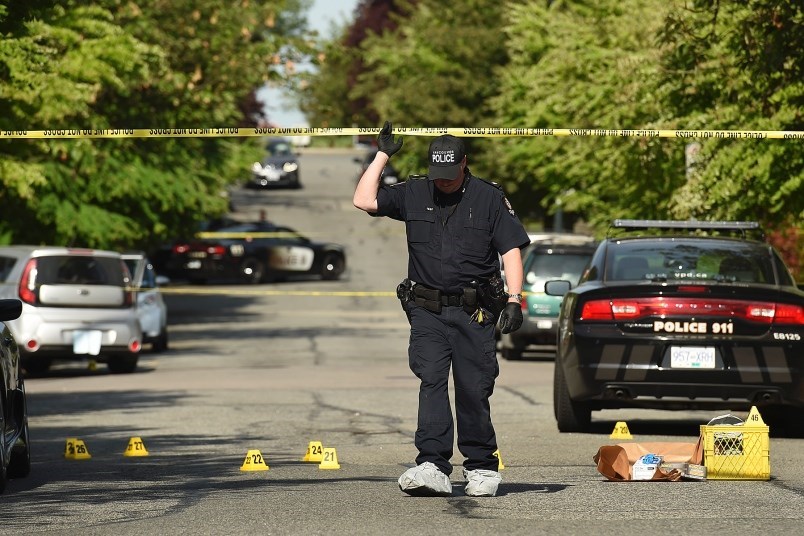Public safety ranked third on a list of top issues identified by 180 members of the Greater Vancouver Board of Trade who were recently surveyed on what concerns are top of mind as the Oct. 15 municipal elections approach in British Columbia.
Cutting red tape related to obtaining permits and licences ranked first followed by the need for more affordable housing in Vancouver and across the region, where rents and housing prices continue to climb to stratospheric heights.
In announcing the survey results Thursday (May 12), Bridgitte Anderson, president and CEO of the board of trade, said in a news release that public safety has not “registered this high on businesses’ radars in recent memory.”
At the same time, the survey showed public safety ranked fifth when respondents were asked to identify the top issues not being addressed in a satisfactory way by municipal governments.
Homelessness ranked first in that category, followed by housing, fiscal responsibility and ease of doing business in a municipality.
Public safety forum
The survey doesn’t break down where each member operates or belongs to a business but Vancouver politicians and police have heard loud and clear from many business owners, business associations and citizens that public safety is a top concern.
That was evident at a two-day city council-hosted public safety forum at city hall on April 28 and May 10, where business leaders from Chinatown, Gastown and Commercial Drive told stories about street disorder, drug use and graffiti.
Nick Pogor, executive director of the Commercial Drive Business Society, said crime, vandalism, graffiti, excessive open liquor consumption, drug use, camping in parks and on streets is the norm on the Drive.
“This is a super, super important issue not only for the residents of Vancouver, but a very, very pressing matter for small business in the city of Vancouver and especially on Commercial Drive,” Pogor said.
“Street disorder is at an all-time high on Commercial Drive, and the worst we have seen it in the many last decades. Those who live in the neighbourhood, those who visit the neighbourhood, those who work in the neighbourhood all have concerns for their own safety.”
'Become unmanageable'
Pogor said small business operators cannot and should not be left to manage safety and security services in their retail districts, adding that “it has become unmanageable, and it is not financially feasible.”
He wants to see regular beat patrols by police, but said “the VPD cannot be left alone to manage all of these issues on their own.”
Pogor recommended to council that park board rangers be present in all of the city’s parks and that more street-level outreach from Vancouver Coastal Health and BC Housing is needed to get help to people without a home.
“All this requires more housing solutions,” he said. “And I applaud the city's work in recent months and recent years to gain support from the provincial and federal levels to this end. This is good work. Keep it up.”
Affordability concerns
But public safety was not cited as the reason why 64 per cent of respondents said they have considered relocating their business outside of the region — it was because of affordability concerns.
That statistic is coupled with the fact 83 per cent of respondents said the cost of housing in the region has had a large or some impact on the ability to recruit employees.
Most respondents (79 per cent) support provincial government intervention if cities reject affordable housing projects, but a third (32 per cent) indicated that proposed legislation is too heavy-handed.
Other results of the survey, which was conducted between April 4 and 22, included:
• 71 per cent strongly or somewhat support Indigenous-led bid to host 2030 Winter Olympics and Paralympics.
• 62 per cent said investment in transit has been insufficient to keep up with needs of population.
• 83 per cent support SkyTrain to UBC, 81 per cent support rapid transit to North Shore, 76 per cent want to SkyTrain to go Langely and 74 per cent want the rapid bus network to be expanded.
Full results can be read on the board of trade's website.
@Howellings






